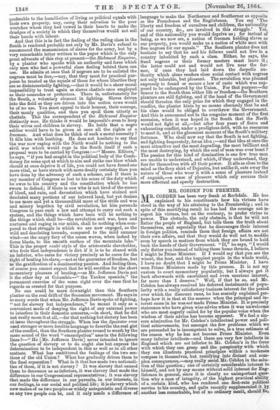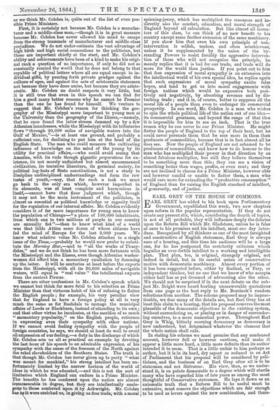MR. COBDEN FOR PREMIER.
COBDEN has been very frank at Rochdale. He has
IT explained to his constituents how his virtues have stood in the way of his attaining to the Premiership ; and in spite of this mortifying result he has had the courage not to regret his virtues, but on the contrary, to prefer virtue to power. The obstacle, the only obstacle, is that he will not flatter the people of England, but tells them the truth about themselves, and especially that he discourages their interest in foreign politics, reminds them that foreign affairs are not their own affairs, and that they would do well not to meddle even by speech in matters from which they are bound to hold back the hands of their Government. "If," he says' "I would only flatter you instead of talking these home thrusts, I believe I might be Prime Minister. If I would say that you are the wisest, the best, and the happiest people in the whole world, I have no doubt that I might be Prime Minister. I have seen Prime Ministers made by this process. It is not my custom to court momentary popularity, but I always get it back afterwards with exorbitant and even usurious interest, far more than I deserve." Well, if that be so, and Mr. Cobden has always received his deferred instalments of popu- larity with a really satisfactory business interest for the period over which the discount runs, he has scarcely explained per- haps how it is that at the seasons when the principal and in- terest came in he was not made Prime Minister. It is precisely statesmen who have given wise advice when it was unwelcome who are most eagerly called for by the popular voice when the wisdom of their advice has become apparent. We feel a sin- cere admiration for Mr. Cobden's intellectual power and poli- tical achievements, but amongst the few problems which we are persuaded he is incompetent to solve, is a true estimate of the reason why he has not become Prime Minister. Even many inferior intellects—and there are very few intellects in England which are not inferior to Mr. Cobden's in the force with which they can grasp and the perspicuity with which they can illustrate practical principles within a moderate compass in themselves, but ramifying into distant and com- plex consequences,—may really assist Mr. Cobden in the solu- tion of this question ; one of certainly considerable interest to himself, and not by any means without solid interest for Eng- lishmen in general, since it is clearly no unimportant ques- tion why a man of integrity, of the highest practical ability of a certain kind, who has rendered one first-rate political service to his country, and quite recently supplemented it 0- another less remarkable, but of no ordinary merit, should be, as we think Mr. Cobden is, quite out of the list of even pos- sible Prime Ministers.
First, it is certainly not because Mr. Cobden is a manufac- turer and a middle-class man,—though it is in great measure because Mr. Cobden has never allowed his mind to escape from the strong trammels of manufacturer and middle-class prejudices. We do not under-estimate the vast advantage of high birth and high social connections to the politician but these are important chiefly at the start, and Mr. Cobden's ability and achievements have been of a kind to make his origi- nal rank a question of no importance, if only he did not so constantly remind the world that he does not belong to that republic of political letters where all are equal except in in- dividual gifts, by pouring forth private grudges against the culture of ages, and against the acts of aristocratic statesmen not because they have done amiss, but because they are aristo- cratic. Mr. Cobden no doubt suspects it very little, but it is still true that even in this speech we can find for him a good many better reasons why he cannot be Premier than the one he has found for himself. We venture to suggest that Mr. Cobden's reason for thinking the geo- graphy of the Mississippi more important to young men at the University than the geography of the Ilissus,—namely, that he once found the latter stream dammed up by a few Athenian laundresses, while the Mississippi with its tributaries flows "through 20,000 miles of navigable waters into the Gulf of Mexico,"—is at least one ground, and probably a sufficient one, for declining to put him at the head of the English State. The man who could measure the cultivating influence of knowledge on the mind of the young by its utility for practical affairs,—who could avoid seeing that America, with its rude though gigantic preparations for ex- istence its not merely unfinished but almost uncommenced civilization, its tentative literature its germinal society, its political log-huts of State constitutions, is not a study to discipline undisciplined understandings and form the raw tastes of youth,—nay, that for such a task we must go back to the only era which, however imperfect in its elements, was at least complete and harmonious in itself,—cannot have that finer judgment which, though it may not be the main instrument of the politician, is almost as essential as political knowledge or sagacity itself for the regulation of our internal affairs. Mr. Cobden evidently considers it of far more importance for young men to know the population of Chicago—" a place of 150,000 inhabitants, from which one to two millions of people in our country are annually fed "—than to know what kind of a world was that little Attica some dozen of whose citizens have fed the mind of Europe for the last 2,000 years. We know what relative value Mr. Cobden attaches to a single issue of the Times,—probably he would now prefer to substi- tute the Morning Stan—and to "all the works of Thucy- dides," and we do not think he has been more fortunate with the Mississippi and the Mous, even though Athenian washer- women did afford him a momentary exultation by damming up the latter. It will be centuries at least before the exports from the Mississippi, with all its 20,000 miles of navigable waters, will equal in "real value" the intellectual exports from the ancient Pincus.
There are other confessions in Mr. Cobden's speech which we cannot but think far more fatal to his selection as Prime Minister than that virtuous habit of his of refusing to flatter the English people; for example, his very peculiar view that for England to have a foreign policy at all is very mach the same as for Rochdale to manage the municipal affairs of Leeds or Blackburn, instead of attending to its own ; and that other virtue he inculcates, at the sacrifice of so much "momentary popularity," on the English people, reticence in expressing even their sympathy with other nations. If we cannot avoid feeling sympathy with the people of foreign countries, he says, we should at least do well to avoid all expression of our feeling,—a duty in the discharge of which Mr. Cobden sets us all so practical an example by devoting the last hour of his speech to an admirable expression of his sympathy with the cause of the freemen of the North against the rebel slaveholders of the Southern States. The truth is that though Mr. Cobden has never given up to party "what was meant for mankind," his strong intellect has been un- fortunately limited by the narrow horizon of the world of ideas in which he was educated,—and this is not the sort of limitation which England can endure in a Prime Minister. The benefits he has conferred upon the nation are almost *measurable in degree, but they are intellectually analo- goiss to those conferred upon. it by Arkwright. Mr. Cobden has it were enriched us, in giving us free trade, with amoral spinning-jenny, which has multiplied the resources and in- directly also the comfort, education, and moral strength of England beyond all calculation. But like almost all inven- tors of this class, he can think of no new benefit to his country except some further extension of the same machinery. If you show him that even his own principle of non- intervention is selfish, useless, and often mischievous, unless it be supplemented by the union of the by- standing Powers to resist forcibly the aggressive interven- tion of those who will not recognize the principle, he merely replies that it is bad for our trade, and trade will do more for the world than justice. If you point out to him that free expression of moral sympathy is an extension into the intellectual world of his own special idea, he replies again that such expressions of moral sympathy excite false hopes, and tend to get us into moral engagements with foreign nations which would be expensive both posi- tively and negatively, by absorbing revenue and by dis- turbing trade ; and it is, of course, better to suppress all the moral life of a people than even to endanger its commercial prosperity. In one word, Mr. Cobden is a man who wishes to spin the whole political life of the nation out of one idea— its commercial greatness, and beyond the range of that idea it is impossible for him to Bee an inch. That is the true reason why he can never be our Prime Minister. Ho might flatter the people of England to the top of their bent, but he could never persuade them that he sees more in them than producers of commodities, because that is in fact almost all he does see. Now the people of England are not ashamed to be producers of commodities, and know how to do honour to the man who has multiplied their ;power in that direction by an almost fabulous multiplier, but still they believe themselves to be something more than this ; they can see a vision of something better than wages, profits, or even rent; and they are not inclined to choose for a Primo Minister, however able and however candid or unable to flatter them, a man who would care more for exteuding the "productive consumption" of England than for raising the English standard of intellect, of generosity, and of justice.



































 Previous page
Previous page